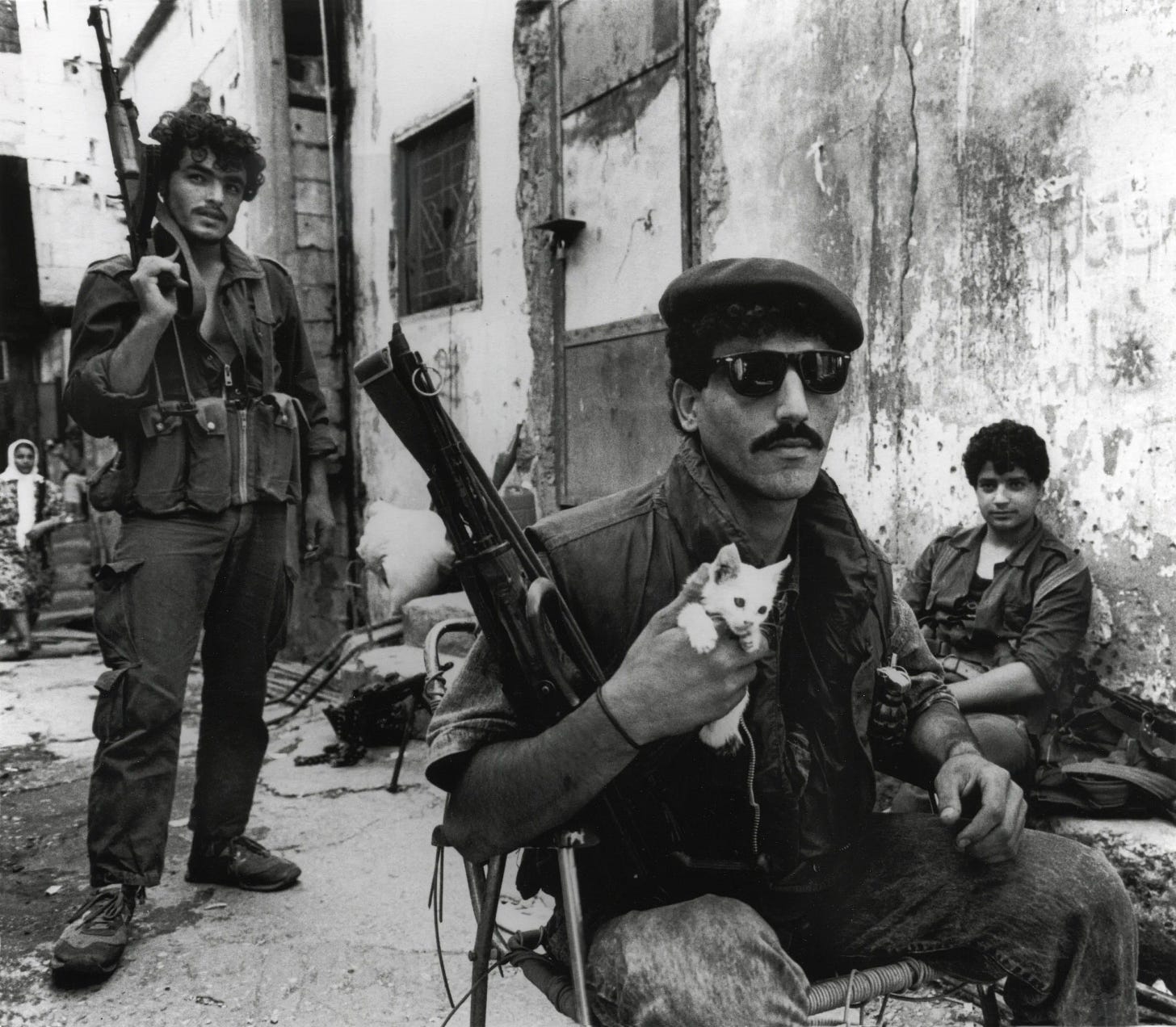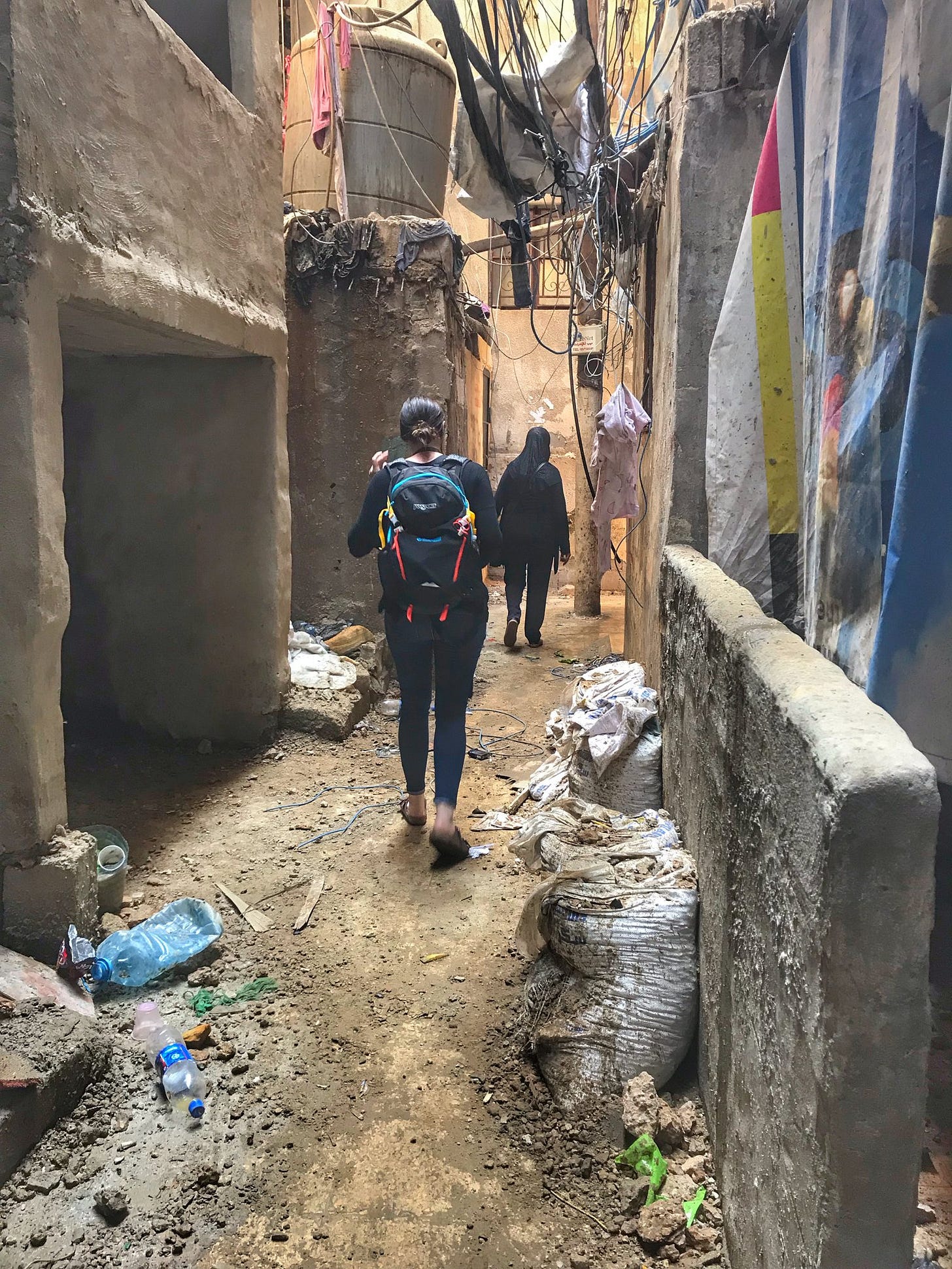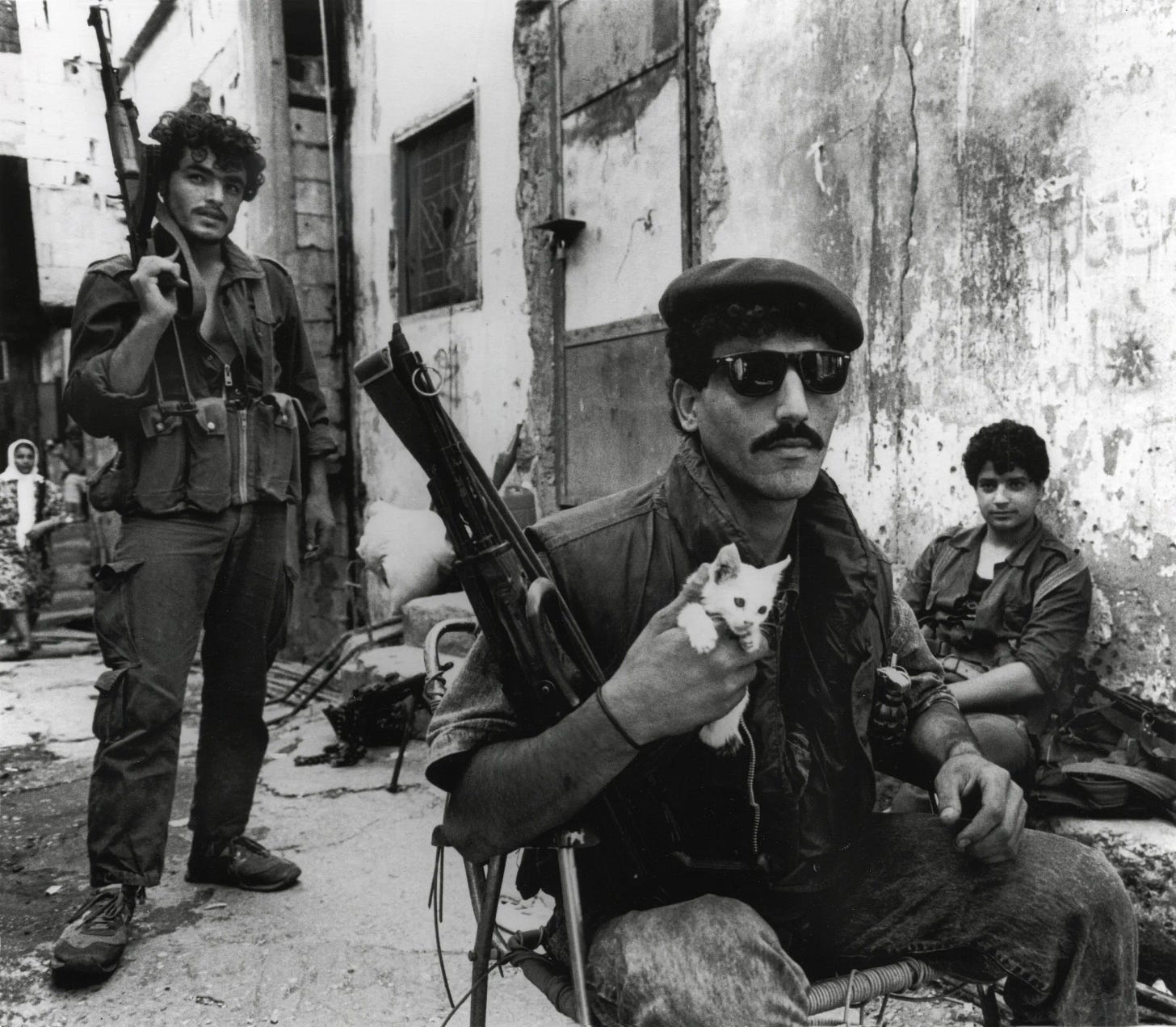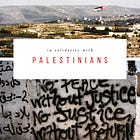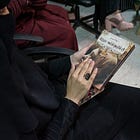I’ve been thinking of this image a lot lately.
It’s from 1988 during the Lebanese Civil War, taken by a photographer named Aline Manoukian. She captured this iconic scene of a Palestinian fighter in Bourj Al Barajneh Palestinian refugee camp in Beirut.
Many Palestinians were made refugees and the “temporary” camps were set up across the Middle East in primarily two waves of the Nakba, when Israel murdered and expelled nearly a million Palestinians in order to create the State of Israel between 1948 and 1967 and on. There have been Palestinian refugees in Lebanon, Jordan, Syria, Egypt and internally displaced in historic Palestine (now called Israel) since 1948.
I’ve visited Bourj Al Barajneh refugee camp, and several others in Jordan, Lebanon, and the West Bank, Palestine, in the past ten years to support Palestinian projects and bring stories back in the U.S. through documentary photography and creative projects. When I was first in Shatila camp in Beirut, I was taught to spot the bullet holes still present in the cinder block walls 35 years after the civil war ended. You can see them in the photo above. Each of these camps were built long ago to be temporary shelter for temporarily displaced people. So much forgotten history and so many forgotten people live in the camps.
Today, Palestinian refugees are considered permanent refugees because they have not been allowed to return home in nearly 77 years. And they were already the largest and oldest group of refugees in the world in 2022. This “war” did not begin 18 months ago. This “conflict” didn’t start with Hamas. It began decades ago. It even began decades before this photograph was taken.
When I visited the Palestinian refugee camps, people there asked me to describe Palestine to them when they learned I’d been. This was a simultaneously reverent and ghastly role, to mediate between two worlds. They’d asked, “What was it like? Tell me about the people. Do they remember us?” Most of the Palestinian refugees in Jordan and Lebanon don’t have citizenship in the country they live, nor Palestine or Israel, so they don’t have passports, or a country to return to, and can’t travel to their homeland. So they were asking me.
This reality breaks my heart. That I could have seen or known something of someone’s own homeland they can’t access because of made up borders and papers and racist ideologies is devastating and humbling.
But I have this privilege. The questions is: what am I going to do with it?
I saw a video last week of the Israeli Defense Forces dropping bombs on tents in the South of Gaza in Khan Younis. PEOPLE LIVING IN TENTS.
How are we allowing this?! Why is the American government still backing this?! How do we end this massacre?!
I first asked these questions over ten years ago, after my first trip to Palestine in 2015. I was taught to recognize that a feature (not a bug) of the ethnic cleansing of Palestine by the Israeli empire is that Palestinians have been dehumanized and rebranded as terrorists to allow for their extermination.
The logic goes like this: if they aren’t people, they don’t matter. And if they don’t matter, they can be killed. And if they can be killed, the land is cleansed. And if the land is cleansed… well, Israel can just say it was always an empty land without a people, for a people without a land.
This is how it's all been justified since before 1948.
Justifying refugees living in temporary camps all across the Levant for 77 years. Justifying 7 million people denied their right to return to Palestine. Justifying Gazans being caged, bombed, and starved to death for the past 18 years, and intentionally genocided for the past year and a half. Justifying the targeted murders of journalists, students, artists, rescue workers, and medical professionals. Justifying the IDF bombing Lebanon, Syria, Iran, and Yemen in “self defense.” Justifying the onslaught against Palestinians in the West Bank by the IDF and settlers alike to force them off the land. Justifying U.S. tax dollars funding the brutal genocide of the Palestinian people just so Israel can steal more land.
My only hope these days is that we’ve all seen it now. As painful as it’s been to witness the further collapse of international human rights. As horrific as it's been for individuals and journalists in Gaza to livestream their resistance and humiliation and slaughter on the internet FOR US so we could put a stop to it.
We have this privilege: what are we going to do with it?
Recently a friend from my hometown reached out asking for support for his friend in Gaza who was trying to evacuate from Khan Younis, where he was not safe. I sent the money to my friend. Then I apologized that he had to jump through so many hoops to ask for support, but I understood why.
Unfortunately in America, our baseline understanding is Palestinians don't matter so the conversation is forced to become proving that they DO, even in the context of their struggle. All the caveats and apologies and disclaimers and justifications are required for even making the appeal. Verifying he wasn’t Hamas, just a regular guy. Evidence he was actually buying flour. Testifying he wasn’t anti-Zionist but Christian. Otherwise, we’d have no framework to determine if this person is one of the “good guys” worth saving.
The expectation for Palestinians to have to work to humanize themselves, and for their allies to have to humanize Palestinians again and again and again is the unjust manifestation of our ingrained White supremacy and Islamophobia. Palestinians should not have to prove that they are not violent militants, or that they’re good Christians or good Muslims, or that they’re just infants who haven’t even had a chance to be evil yet, or that Palestinians deserve to exist, to live, to have basic needs like water and power in their hospitals to save the lives Israel is trying to end.
This is the effectiveness of the empirical intentions to delete the humanity of Palestinians. Have you noticed the focus on all the babies killed in Gaza, highlighting the presumed innocence of some and not others? It assumes questionable motives of Palestinian men, flattening and vilifying them just enough to hold them to a standard that is guilty until proven innocent. As if the killing of children, women, and the elderly is somehow more problematic than the killing of men and boys, young and old, who’ve been targeted in the genocide as well. This is simply untrue. It is a travesty in the first place that aid is needed in response to this completely preventable humanitarian crisis. It’s a further catastrophe to dehumanize those who need urgent help.
When I was sent a video from our friend in Gaza, I wept when he said thank you, from Gaza. I wept for this man I really don’t know, but do I need to know someone personally to understand he is trying so hard just to survive being trapped by Israel and the bombings and constant fleeing with no where to go, and being deprived of electricity and clean water and having to buy $200USD sacks of flour in a man-made famine? That he is worthy of dignity and love and solidarity? To believe, fundamentally, he deserves to live?
I have some honest, audacious questions for us. Had he been connected to Hamas, would he not have the right to exist as a human? Had he been critical of Israel, could you really blame him!? Had he been buying himself a vice or a little treat to get by instead of flour and water, does he no longer deserve to live? What about this man would make him your enemy at all?
I deeply understand the purpose of due diligence, but this can’t be so extractive, so crushing. The Palestinian people in Gaza have been through so much – they have all survived several wars – and those of us with the power to make a difference still like to say “prove it” once more before lending a hand. We do not need to serve our own sense of moral superiority through the goodness of our selective charity cases right now. We do not need an exploitive charity model to exist for us so we can center ourselves and feel righteous about performing our help. Palestinians are repeatedly being displaced and subject to so much horror, violence, and trauma — we already have all the proof of that we could possibly need — shouldn't that be enough?
Palestinians in Gaza are simply trying to survive one more day until the day the world – until WE – can finally put a stop to this madness. We can't seem to manage that yet, and we certainly have no right to demand a performance of perfect victimhood and martyrdom in the meantime.
We cannot participate in dehumanization in order to justify respect or support. Palestinians are not just their pain and resistance and struggle, they are so, so much more.
This is a tension that we have to stay with, not wriggle our way out of.
My visits to the Middle East and in the camps were turning points for me and I’m eternally grateful for the experiences and people who’ve given me insight and courage to fight. But my proximity doesn’t equate to an exceptional connection one must have to care or act. It doesn’t have to happen to you or be first-hand experience for you to care and show up. Though I’ve done my best to bring you with me over the years, this is going to take all of us, together in solidarity, mercy, and scandalous compassion.
This is all of our societal responsibility: to respond, to resist, to revolutionize, to repair, to restore, to reconcile. Boycott and divest, protest with demands, keep working for change. Remember that you have not failed, but the systems have failed you. How else do we arrive at subjecting “WHERE’S YOUR HUMANITY?!” at one of the most made-vulnerable and made-oppressed populations in the entire world who also happens to not be White, Western, Zionist, or majority Judeo-Christian.
As the violence churns on, today I want to remember and remind us of what we have to do. We must end the genocide, siege, and blockade in Gaza, the apartheid and occupation in Palestine, and allow all Palestinian refugees their right to return home. Even though it feels like never enough or far too idealist, we have to keep going. Palestinians have never given in and stopped resisting, so neither can we.
I want to sit down in this scene with hot qahwah or instant Nescafé and get to know their stories: the soldier with the cat, the other soldier, the woman, the shabab, the photographer, the tiny kitten. And if I know anything at all about Arab hospitality, it's that I'd be welcomed and subject to the genuine presence and gentleness captured here. I want to sit in the mess together and reclaim our shared humanity. I want to ask questions that get at heart of the complicated human experience. I want to develop more compassion and nuance together.
Look at the man with the kitten, notice his complexity. So many things can be true at once.
The hands that pull the trigger resisting colonial violence could be the hands that gently cradle the spindly rib cage of a kitten.
They could be the hands that offer any one of us connection and community over cups of coffee.
They could be the hands that pen the poetry and art that helps us grasp the world.
They could be the hands that tuck in his little girl at night in an overcrowded shelter that used to be her primary school.
They could be the hands of the medics and civil defense teams and surgeons wrapping white shrouds on their own mothers and fathers.
They could be the hands pulling their neighbors out from under the rubble.
They could be the hands holding onto the old iron key to the door they'll never darken again.
They could be the hands kneading bread or prayers on the floor of a tent in Gaza tonight.
This is the human element.
This is humanity.
Free Palestine,
Ways to help.
Give
Message me if you want to send funds to our friend in Gaza. Sohaib was able to get out of Khan Younis. Israel's still attacking the “safe zones” and blocking aid from entering Gaza, so our friend will need continued support to purchase basic necessities and the means to survive deteriorating conditions. Thanks to Mohammed for your generosity, encouraging me to share parts of our conversation, and for introducing me to Sohaib. He's not alone or forgotten. We're all connected.
The Palestinian Grassroots Distribution Project is supporting many extended families in Gaza and recent refugees displaced to Cairo, Egypt. You can support them by making a donation to PGDP. It’s an incredible community making a tangible impact.
Learn
Buy and read Mohammed El-Kurd’s new book, Perfect Victims and the Politics of Appeal.
Buy and read Omar El-Akkad’s new memoir, One Day, Everyone Will Have Always Been Against This.
Watch the Oscar-winning documentary No Other Land, now available for streaming in North America until May 8.





